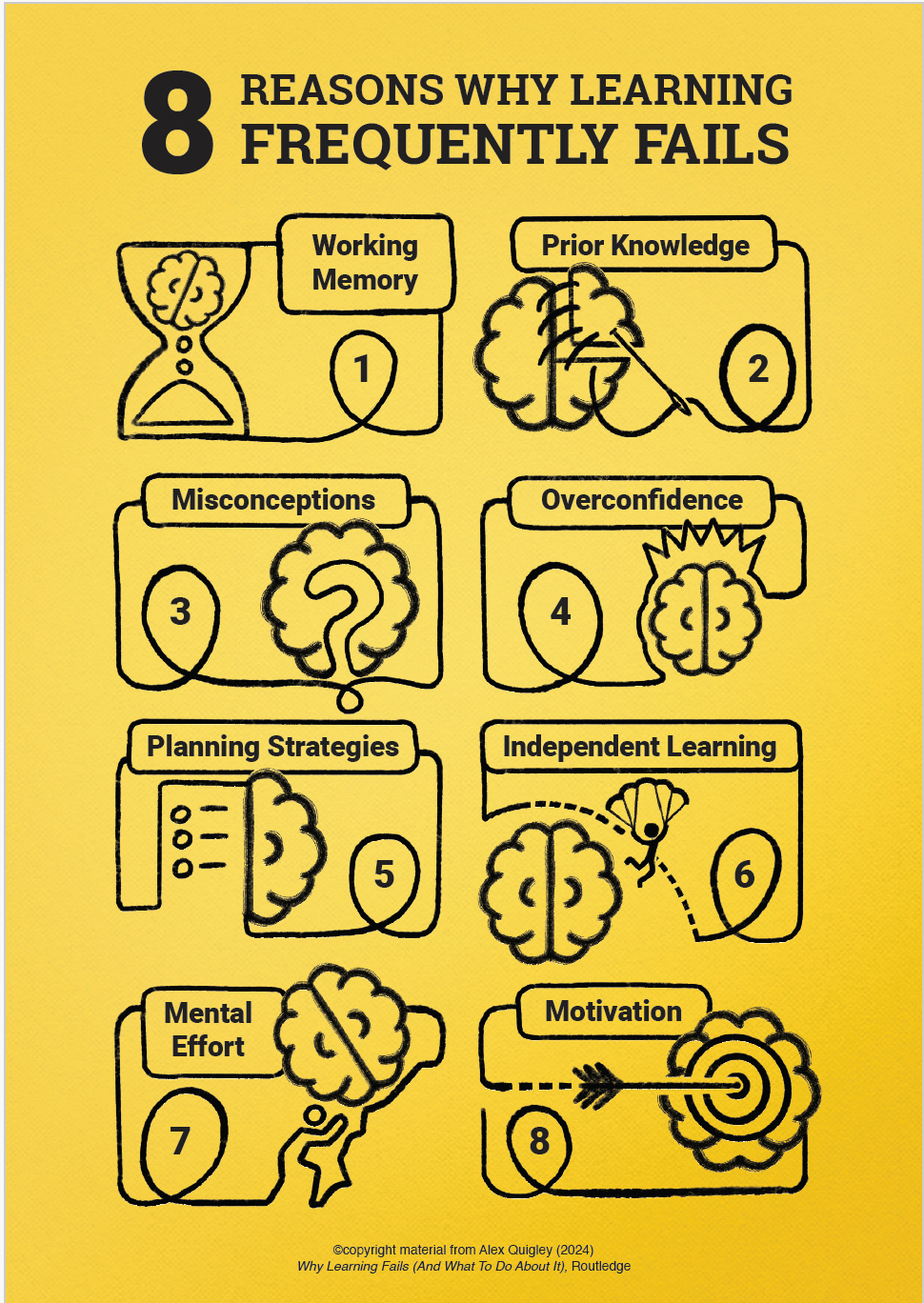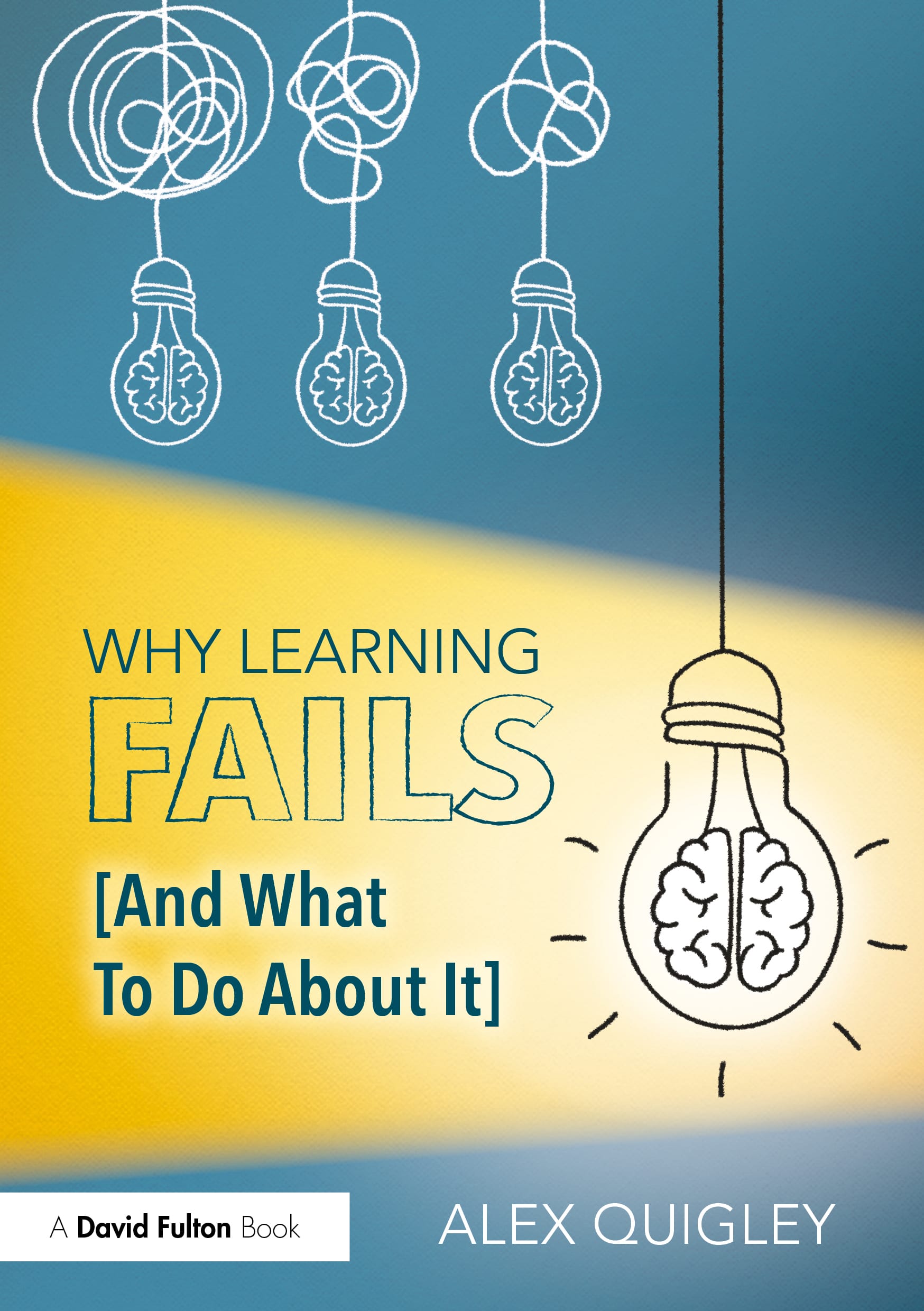“Failure is simply the opportunity to begin again, this time more intelligently.” Henry Ford
We can all be quick to celebrate our successes, but we can possess a natural reluctance to share or talk about failure. And yet, given how complex teaching and learning in the classroom proves, it becomes a necessity that teachers learn from failure and respond intelligently to ensure that they secure success.
Instead of assuming that failure is bad, or caused by blameworthy personal attributes, we need to recognise that failure is a natural occurrence that attends all new learning, particularly when undertaking tasks at the edge of our competence.
Failure is ever-present when we learn because our brain is brilliant but, ultimately, unreliable. If we can better anticipate such failures, we can teach with greater likelihood of success.
In my new book, I have defined eight common reasons for failure:

Learning failure #1 The narrow limits of working memory
You when that word is on the tip of your tongue, but you can’t recall it? Or when you teach a concept Monday, but by Wednesday it is like it never happened? These are the limits of working memory playing out in daily l learning failures in every classroom. Working memory is essential for new learning and particularly pupils dealing with complex tasks, so it gets a near constant workout. There isn’t an app for expanding your working memory! Instead, teachers need to grapple with storytelling, curriculum sequencing, ‘chunking’, and more.
Learning failure #2 Patchy prior knowledge
Prior knowledge underpins all successful learning, but pupils’ patchy prior knowledge also bedevils attempts at coherent curriculum design and trips up the best planned teaching. We need to aid pupils to build their knowledge and monitor their comprehension as they read. Worked examples, quality talk, graphic organisers, along with other approaches to effective teaching can help increase the changes of learning success.
Learning failure #3 The nagging nature of misconceptions
Misconceptions about the world are a constant cause of small learning behaviours. From notions of blue blood in science, to flagrant falsehoods that attend historical figures, pupils – and their teachers – have to manage in a minefield of potential misconceptions. There is no easy, quick fix, but attention to questioning, prediction-making, and crafted repetition can help make a difference.
Learning failure #4 A curious case of overconfidence
Confidence is good, right? Well, the social confidence for pupils to speak in front of their peers, or on the stage in the school play is great, but overconfidence in our knowledge or ideas can prove a problem. A failure to judge one’s own learning can lead to poor choices around class learning, homework, revision, and more. We need to help pupils to better judge their learning, and to fend off the failures of overestimation and overconfidence. With confidence tests, delayed judgements, and other strategies, we can help recalibrate confidence and fend of failure.
Learning failure #5 Faulty planning strategies
We can all fall for the ‘planning fallacy’ – assuming we have more time and capacity than we have, but pupils can be particularly prone to poor planning. Youngsters and teens alike simply don’t plan in the ways we’d hope without ample scaffolding and a range of carefully chosen teaching and learning strategies. There are planning strategies, checklists, and more that can help, when supported with cumulative practice to scaffold independence.
Learning failure #6 An inability to learn independently
Independence – the pot of gold at the end of the learning rainbow! Everyone in education talks about needing it – bemoans its absence and failures – but there are fewer confident plans to develop it for all our pupils. Whether it is working on an online maths app, or practising a musical instrument, independent learning needs substantial teaching to happen. Paradoxically, offering more independent does not equate to better independent learning. The run up to exams – every year, ever – is a testament to this challenge. We can ‘name’, ‘frame’ and sustain’ independent learning strategies and craft a timely shift of responsibility over to learners – but this stuff is hard, and prone to fail.
Learning failure #7 Wandering attention and miserly mental effort
In an age of social media and slick short videos, how can we stave off wandering attention and miserly mental effort? By better understanding split attention, the habit of mind wandering, and attentional bias, we can better craft teaching and learning so that pupils can sustain their mental efforts. Again, an explicit approach can translate failure to success, from switching attention, stimulating interest and ‘cued remembering’ can help.
Learning failure #8 Falling motivation in the face of failure
All this talk of learning failure reminds us that a lot of classroom experiences can drain our pupils of all their motivation. We just need to consider a pupil whose daily experience is to struggle to read words from the page of a textbook to consider the vital importance of sustaining motivation. Pupils can be nudged from sour grapes to pursuing success with targeted approaches goal-setting, ‘If…then…’ strategies, and much more.
Find out much more about the problems and solutions that can attend learning failure in my new book, ‘Why Learning Fails (And What to Do About It)’, is published on the 8th May
Sign up to my blog for new FREE resources on 'Why Learning Fails'.
Order from Amazon now HERE
Order from Routledge now HERE.







Comments